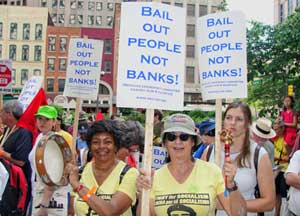2010 U.S. Social Forum in Detroit
Historic gathering advances anti-capitalist outlook
By
Betsey Piette
Detroit
Published Jun 30, 2010 5:59 PM
More than its predecessor in Atlanta in 2007, the U.S. Social Forum in Detroit
June 22-26 reflected the growing awareness that although the struggles at home
and internationally have many fronts, they share a common enemy —
capitalism.
|
Activists of many nationalities and ages
marched
June 25 to the Chase bank to make
the links
between the struggles at home and
abroad
during the Social Forum in Detroit.
WW photos: Bryan G. Pfeifer
|
The growing need to unite in an anti-capitalist movement brought an estimated
20,000 people to Detroit from all over the U.S. and around the world.
Overwhelmingly these forces were youth, people of color, women, workers and the
oppressed.
USSF participants had over 1,000 workshops to choose from, which featured such
issues as the crisis of capitalism; climate justice and sustainable resources;
displacement and migration; political repression and the prison industry;
organizing efforts for labor; international struggles; housing, education and
health care; racism and gender equality; culture; and political movements on
the left, as well as how to deal with the right wing.
Workshops also addressed solutions, ranging from the struggle for more
democratic rights to the fight to build a socialist world, with examples of how
this is being done in Latin America, notably in Cuba and Venezuela.
Many of these workshops were organized and led by students and youth, and the
broad representation of people of color was evident throughout daily
events.
Detroit: Devastated but gracious host
Several workshops offered the opportunity to learn about the struggles against
foreclosures and plant closings in Detroit from organizations leading these
movements like the Moratorium NOW! Coalition to Stop Foreclosures, Evictions
and Utility Shutoffs.
Tours of Detroit’s abandoned and vandalized neighborhoods caused by
epidemic foreclosures and evictions were organized, although just a drive down
Woodward Avenue exposed many empty lots as well as vacant and boarded-up
apartment buildings and churches. Several USSF-goers stayed at the St. Regis
Hotel, which offered discounted rates, only to learn that this historic
building is also facing foreclosure. Detroiters whom delegates met expressed
their appreciation for the attention the Social Forum brought to their
devastated city.
Special thanks should be extended to the Michigan Welfare Rights Organization,
whose members staffed the USSF office and handled many organizing tasks.
Congratulations to Maureen Taylor and Marian Kramer, leaders of this
organization, for their hard work in pulling off this dynamic event.
Words and deeds, solidarity
Those attending the social forum could, in addition to workshops, take part in
People’s Movement Assemblies organized around geographic regions as well
as broader struggles for economic and social justice. The theme-focused PMAs
drew large numbers of participants and went into depth on issues, including
strategizing around tactics for movement building. Some led to direct actions
during the USSF.
Plenary sessions designed to bring together everyone attending the forum were
held in the evenings in a cavernous space in Cobo Hall. The sessions started
June 23 with a focus on movements in Detroit as the epicenter of the economic
crisis. “From National to International” was the theme of the June
24 plenary, which covered the effects of neoliberal policies at home and
abroad.
The final evening plenary on June 25 featured speakers addressing alternative
solutions. A highlight of this panel was the address by Amenothep Zambrano,
Executive Secretary of the ALBA Permanent Commission, who presented a
comprehensive explanation of why capitalism only leads to more economic and
social crises and why movements to build socialism such as the ones taking
place today in Venezuela and throughout Latin America offer a viable
alternative. (ALBA is the Spanish acronym for the Bolivarian Alliance of the
Americas.)
The Social Forum also included direct actions. In addition to the spirited
opening day “We Have a Dream” workers’ march and rally on
June 22, restaurant workers at the Andiamo Restaurant and their supporters
organized an action in Dearborn on June 24 to demand $125,000 in stolen wages
and just treatment on the job for the mostly immigrant workforce.
On June 25 a demonstration organized by the Moratorium NOW! Coalition, the Farm
Labor Organizing Committee, and the Spirituality and Religious PMA drew 1,000
protesters. They marched to a Chase bank to link the struggles against
evictions and foreclosures in Detroit with the fight of migrant workers at R.J.
Reynolds in North Carolina, where Chase is Reynolds’ bank.
On June 26 at a rally called by the Zero Waste Detroit Coalition and organized
through the Environmental Justice PMA, several hundred people gathered at the
Detroit Public Library for a march to the world’s largest incinerator.
This polluting monstrosity, owned by Covanta, is located in a residential
neighborhood across from a public school. Participants included residents,
environmental activists, union members and youth, many carrying eight-foot
sunflowers with slogans reading “Clean air,” “Good
jobs” and “Justice for all.”
Throughout the five-day gathering, participants also attended cultural
performances, movies and social gatherings, including massive impromptu dance
parties, and they browsed at literature and book tables where lively
discussions were held.
The 2010 U.S. Social Forum was an important step in uniting and defining the
movement needed for the workers and oppressed to successfully fight against
capitalism. It will stand as an historic event in building that movement.
Articles copyright 1995-2012 Workers World.
Verbatim copying and distribution of this entire article is permitted in any medium without royalty provided this notice is preserved.
Workers World, 55 W. 17 St., NY, NY 10011
Email:
[email protected]
Subscribe
[email protected]
Support independent news
DONATE


